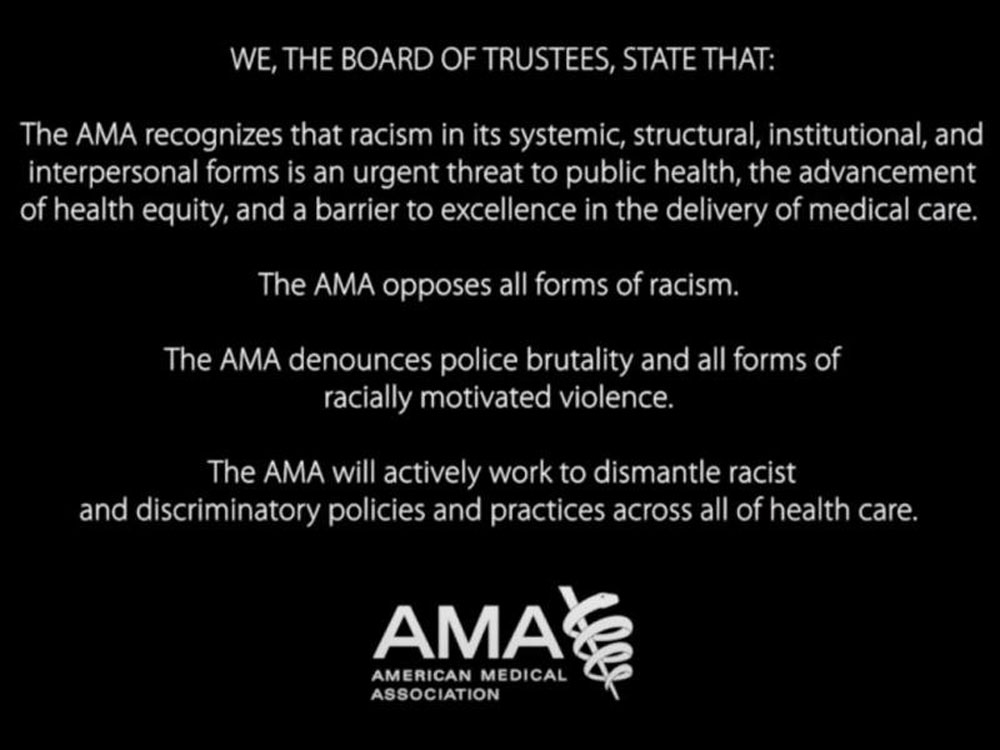
November 16, 2020; Modern Healthcare
In June, the American Medical Association (AMA) pledged to confront systemic racism and police brutality. Yesterday, it built on that move by voting to declare racism a serious threat to public health and specifying some explicitly anti-racist steps that must be taken to address the problem at its most systemic and functional levels.
This marks a major change for the typically conservative nonprofit trade association. The AMA has over 250,000 members, more than one in six of the estimated 1.34 million practicing physicians and medical students in the US. Just last year, for example, the AMA reiterated its opposition to “Medicare for All” and similar “single payer” health insurance systems.
The new policy, now approved by the AMA House of Delegates, will:
Sign up for our free newsletters
Subscribe to NPQ's newsletters to have our top stories delivered directly to your inbox.
By signing up, you agree to our privacy policy and terms of use, and to receive messages from NPQ and our partners.
- “Acknowledge that, although the primary drivers of racial health inequity are systemic and structural racism, racism and unconscious bias within medical research and health care delivery have caused and continue to cause harm to marginalized communities and society as a whole.”
- “Recognize racism, in its systemic, cultural, interpersonal and other forms, as a serious threat to public health, to the advancement of health equity and a barrier to appropriate medical care.”
- “Support the development of policy to combat racism and its effects.”
- “Encourage governmental agencies and nongovernmental organizations to increase funding for research into the epidemiology of risks and damages related to racism and how to prevent or repair them.”
- “Encourage the development, implementation and evaluation of undergraduate, graduate and continuing medical education programs and curricula that engender greater understanding of the causes, influences, and effects of systemic, cultural, institutional and interpersonal racism, as well as how to prevent and ameliorate the health effects of racism.”
- “Identify a set of current best practices for health care institutions, physician practices and academic medical centers to recognize, address and mitigate the effects of racism on patients, providers, international medical graduates, and populations.”
- “Work to prevent and combat the influences of racism and bias in innovative health technologies.”
The platform also addresses related anti-racist practices in education and research. One of the more interesting recommendations is the elimination from medicine of the notion of racial essentialism, or “the belief in a genetic or biological essence that defines all members of a racial category.” The AMA pledges to, among other things,
- “Recognize that the false conflation of race with inherent biological or genetic traits leads to inadequate examination of true underlying disease risk factors, which exacerbates existing health inequities”;
- “Encourage characterizing race as a social construct, rather than an inherent biological trait”; and
- “Recognize that when race is described as a risk factor, it is more likely to be a proxy for influences including structural racism than a proxy for genetics.”
“The AMA is dedicated to dismantling racist and discriminatory policies and practices across all of health care, and that includes the way we define race in medicine,” says AMA board member Michael Suk. “We believe it is not sufficient for medicine to be nonracist, which is why the AMA is committed to pushing for a shift in thinking from race as a biological risk factor to a deeper understanding of racism as a determinant of health.”
The statement of an active anti-racist position is a major step for the medical trade association. It will be interesting to see if the adoption by the nonprofit of an active anti-racism stance will encourage the AMA to drop its longstanding opposition to universal healthcare, the lack of which in the US is a major contributor to racial health disparities, as a Brookings report released earlier this year documents.
Such a move is not inconceivable. The last vote of the AMA to oppose single-payer in 2019 sustained a narrow 53 percent–47 percent margin.—Ruth McCambridge











